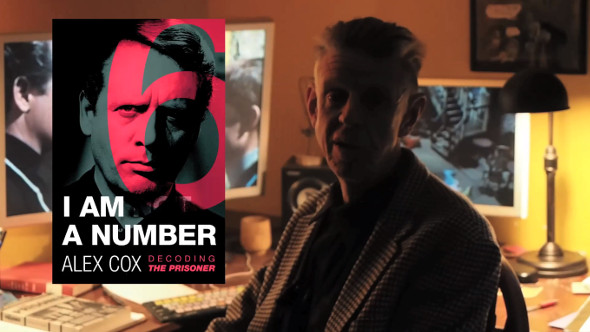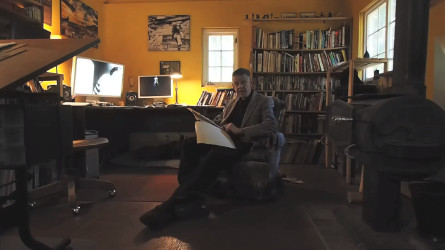I Am (Not) A Number: Decoding The Prisoner
Written By: Alex Cox
Published: 2017
Page Count: 206
Availability: Try Amazon
There have been around thirty books produced on The Prisoner, not counting all the self-published works by the Appreciation Society. What makes "I Am (Not) A Number: Decoding The Prisoner" such a catch is that it's the first one to be written by a real "name" author, in the form of Alex Cox.
The director of many cult films, including Repo Man, he was also the much-respected host of the BBC film series Moviedrome for six years and over 140 movies. This isn't the first book to study The Prisoner solely by watching the programme and consulting no outside source; in fact, it's not even the first instance of the book's subtitle "Decoding The Prisoner", which was the main title of a 1997 work by Chris Gregory. Yet it's the first one to be written by the director of Sid and Nancy.
Sadly, by coming from such a relatively well-known source, the book has greater expectations placed upon it. Cox sets out his stall early, promising readers in an introduction: "Who was The Prisoner? What information did he have? Who were his captors, and why were they so desperate to break him? And who was Number 1? In this book, I'll try to answer these questions. I believe that there are answers to be found, that they are contained in the 17 episodes of The Prisoner, in its scripts, in its story notes, and nowhere else."
 With a promise of an analytical breakdown of the programme, and previously-unrealised-"truths", the book sets itself up for a task it cannot - or does not - live up to. Instead, what we get is a fairly light-hearted, generally surface-level description of the events of each episode, with some historical background etched in. As a result much of the book can be replicated by simply watching the episodes, and the short, flippant "What Have We Learned?" summaries are largely all that is needed. The page count is 206 (including an index), but these are sparse in text, and written in a regular font would have made for a far shorter book. It's notable that Cox seems to have more to say about the later episodes, whereas thematically dense, early entries like Dance of the Dead are glossed over in four pages.
With a promise of an analytical breakdown of the programme, and previously-unrealised-"truths", the book sets itself up for a task it cannot - or does not - live up to. Instead, what we get is a fairly light-hearted, generally surface-level description of the events of each episode, with some historical background etched in. As a result much of the book can be replicated by simply watching the episodes, and the short, flippant "What Have We Learned?" summaries are largely all that is needed. The page count is 206 (including an index), but these are sparse in text, and written in a regular font would have made for a far shorter book. It's notable that Cox seems to have more to say about the later episodes, whereas thematically dense, early entries like Dance of the Dead are glossed over in four pages.Although Cox's background is as a director, there's very little discussion of how the show looks or was shot - save for Living In Harmony - with Cox instead focussing on the narrative of the piece. Occasionally Cox will seem to, surprisingly, not grasp levels of the episodes - such as No.6 sardonically giving the "be seeing you" salute in Arrival, which he appears to take at face value - or openly admits he doesn't understand certain plot machinations, such as his confession about Dance of the Dead that "there follow some plot developments whose utility eludes me."
There's also some oddities concerning Cox's take on the production side. While it shouldn't matter as the book purports to be about the text of the programme itself, at one stage he gives credit to the casting director of Dance of the Dead for casting a female No.2... despite the fact that it's well known that Mary Morris only got the role after the original (male) actor dropped out. It might also seem trivial to point out that Cox, placing the series back in its original 60s context and the period of his youth, makes missteps with said culture. At one point he compares two songs, which are held as examples of having the opposite point of view on revolt, one of them being The Beatles' "Revolution", which offers "you can count me out." This, despite the fact that Lennon can be heard pointedly contradicting himself and immediately singing ".....in" after the quoted line.
Naturally, this being Alex Cox, the book can't go without some interesting observations, and his assertions that viewers only presume No.6 was a spy, and that the Village engaged in cloning experiments, are interesting, if not without flaws. There are also odd lapses of logic, such as his suggestion that the Village and all the No.2s were revealed to be part of the British government as Leo McKern (who had just escaped from the Village) returns to Whitehall in Fall Out.
There's also the exploration of the series by production order, which, while it feels strange to look at Once Upon A Time sixth, does reward by presenting its development in a context not usually tackled in books of this nature. However, Cox's somewhat fan mentality does attempt to build "story" out of what were probably just production coincidences, such as the arrival of the military-style Village security forces, or the absence of Fenella Fielding in later episodes. This is a book that analyses the series as one consistent, tightly-planned narrative, rather than a somewhat loosely-made prime time TV series. (In fairness to Cox, he openly describes himself as a "fanboy" and "Prisoner geek" in an enthusiastic promo video to this book, which is where this page's screencaps are taken from.)

There are also, unfortunately, some lapses into more modern speak. While this book is commendably lively and should never have been dragged down with stuffy introspection, it's something of a surprise to read words like 'nutzoid' and 'PWN' coming from a man in his 60s. There are viewpoints that are perhaps unusual, but this is welcome and to be encouraged for a series which has so many books already written about it: A. B. and C. is described as "the weakest of all the episodes", while Do Not Forsake Me Oh My Darling is praised as "one of the best". Differing takes on the episodes is all part of the fun of being a fan of the series... more surprising is his assertion that "The Prisoner Handbook" (negatively reviewed on this site) is a useful book... perhaps not coincidentally, it's one for which he wrote the introduction, and the Handbook's author proofread the manuscript of I Am (Not) A Number.
After short takes on all the episodes, Cox offers up an overarching conclusion, which is where things get truly bizarre. Insisting on cramming the entire series into one rigid narrative, he rejects entirely the elements of surrealism and allegory in the final episode and instead tries to build a serious story out of the entire thing... coming to the conclusion that No.6 wasn't a spy, but a rocket engineer, and that the man in the "No.1" costume was a monkey who was the result of cloning experimentation.
This may sound like a negative review, but quite the opposite: I Am (Not) A Number is a jaunty, readable work. It's not essential, far from it, but it's a decent time-passer and, even if most of the episode summaries are thoroughly redundant, there are some interesting observations therein. The book also certainly looks nice, with a very modern cover, even if much of what is contained between its pages is old-fashioned.
But while a decent work, it can't help but feel a disappointment when the writer is so well lauded, and his own stated intent with the book was to uncover the "secrets" of the programme. The subtitle of the book is "Decoding The Prisoner". Unfortunately, there's no "decoding" that anyone in possession of the episodes couldn't do themselves, and he does little more than scratch the surface.


